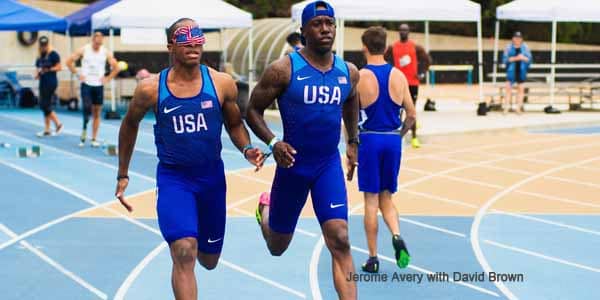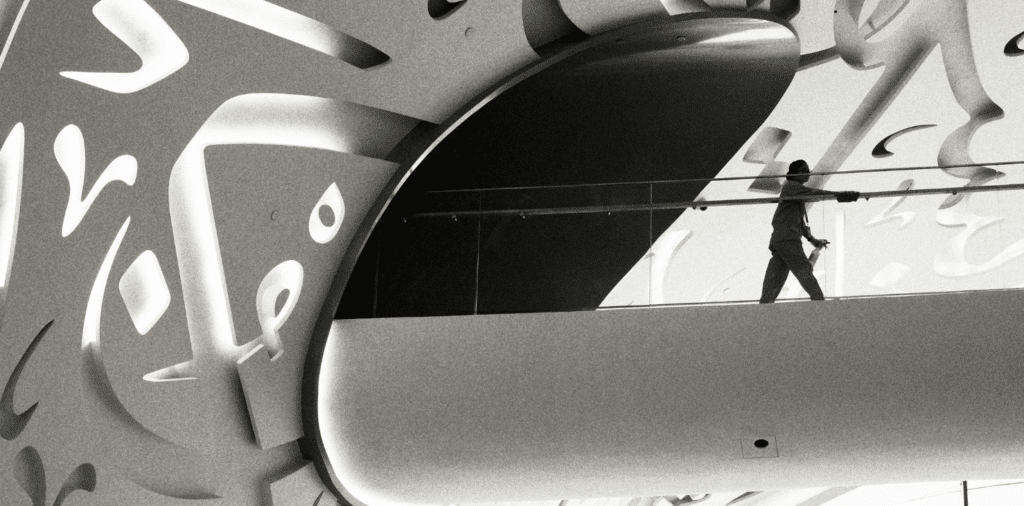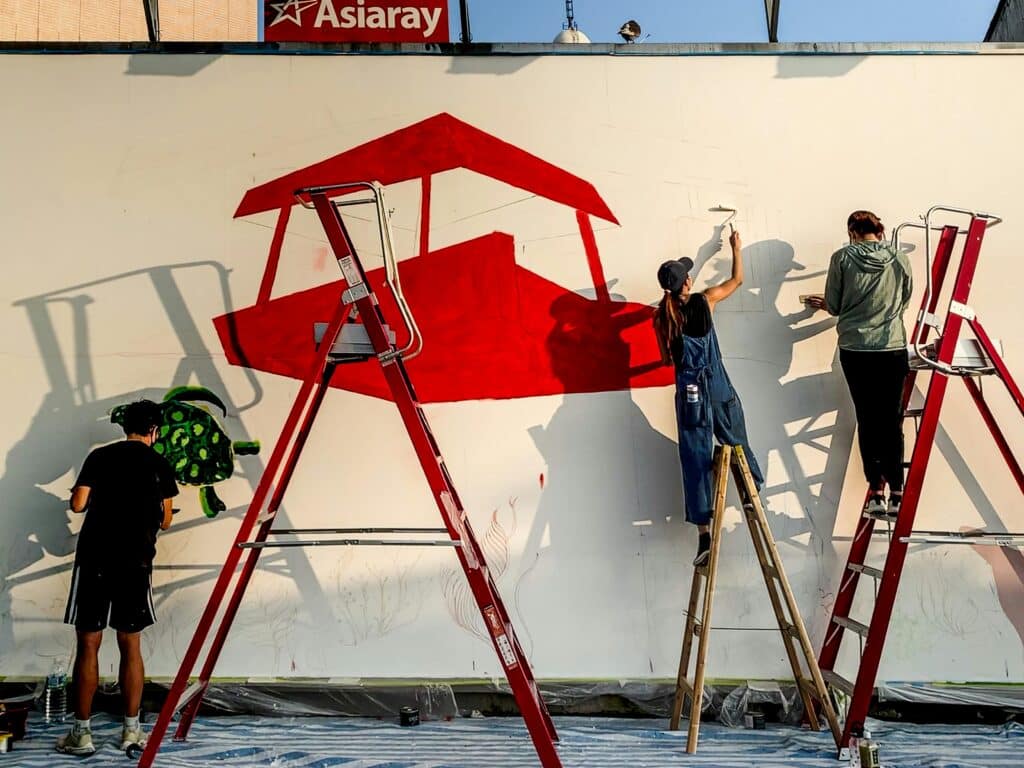Key to Teamwork from a World-Record Holding Guide Runner for Parasprinters

Imagine barreling down a track at high speed, tethered to a visually impaired runner. That person is 100% reliant on you to tell them where to turn, when to speed up, and when to slow down. But you can only do that if you are in sync with your teammate about their needs.
When you don’t know your team’s blind spots, it’s impossible to give them the resources they need to grow. As a leader, you’re responsible for discovering what kind of guidance your team needs to succeed. No one knows this better than Jerome Avery, a guide runner for visually impaired athletes on the U.S. Paralympic team, including world-record holding sprinter David Brown. Bound by a tether, the two sprint side-by-side in lanes on the track, as Avery tugs the tether and uses words to keep Brown in line until the finish line.
Avery has trained for years at Brown’s side, using his toolkit of communication techniques to help Brown “see” where he is on the track and ensure that their race strategy is on point. As an expert in teamwork in high-stakes situations (like the Paralympic Games), Avery gave us his best advice for teamwork and seamless communication, whether you’re on the track or in the conference room.
1. Better Teamwork Comes Through Selflessness
It’s not always easy to put the needs of a team before your own individual success. But by committing completely to the goals of the team, it’s possible to achieve more than you ever would on your own. Avery’s transition from individual Olympic hopeful to Paralympic guide was abrupt: just one day after missing the U.S. Olympic team in 2004, he got a call from a friend on the Paralympic team.
“Hey, do you want to go to Athens, Greece?” recalls Avery. He was informed that he would be a guide runner for visually impaired athletes. Before 2004, “I’d never been around anybody who was blind at all.” But it was an easy choice–Avery had dreamed of going to the Olympics for years, and now he had the chance to participate, even though it was in a role he had never imagined for himself.
With only two weeks to prepare, it was going to be a challenge. But Avery’s selfless attitude and desire to help others paid off: he guided Lex Gillette, visually impaired long-jumper, to the silver medal in those 2004 Athens games. “It was a little bittersweet until I saw Lex smile and get that silver medal,” Avery admits. “Once [Lex] stood on that podium and I knew I was part of that journey…that made me realize that this is something I could do.”
Since 2014, Avery has guided Brown in the 100m and 200m, and the team have earned two world records, 10 national championships, and 5 world championships, among other achievements. Now, Avery recognizes “the journeys I have had as a guide runner have been more than [I ever had] as an individual athlete.”
2. Improve Your Teamwork by Discovering What The Other Person Can’t See
“People in leadership positions often aren’t aware of the handicap that the people that rely on them have,” says Avery. Avery gave participants in the Gold Medal Leadership Experience the chance to try their hand at guiding visually impaired runners in a team-building exercise. In pairs, one teammate put on a blindfold, while the other teammate, connected by a tether had to guide them down a 30-foot track.
Some participants didn’t know what to say, and some didn’t say anything. Avery comments that some of the “guides” “wondered why [their teammate] was veering off to the right, or bumping into them. ”After multiple rounds of practice, the “guides” learned what kind of information their teammate needed from them, and how to guide them down the track more quickly.
The same goes for teamwork in a professional setting. Leaders often lead without considering the “blind spots” that their team has. As a leader, you need to set clear expectations and communicate with effective cues to help them follow the path you’ve laid out.
Who’s relying on you? And how could you be guiding them better?
3. Recognize Your Responsibility As A Leader
As a leader, your job is to guide others, but you can’t be effective if you don’t take care of yourself and your needs first. In Avery’s case, he must make sure his health, training and mental clarity are in top shape for racing and training. “Physically, I always have to be ready.” And mentally? “I can’t zone out…as a guide runner, I have to be alert.”
Avery doesn’t take his responsibility lightly. “Someone is fully relying on me, my sight, my skill set as a guide to get him from A to B, not only for getting there, but to win the race. So that’s a big deal right there.” And when Avery focuses on himself, his surroundings, their position on the track, and the race strategy, Brown is able to focus on his singular job: running fast.
4. Teamwork is Like Any Other Skill: It Takes Work
Avery’s best advice for leaders in positions of high responsibility? Teamwork is a skill, just like any other skill in your business or professional life. Now, after more than 14 years as a guide, “it’s second nature,” says Avery. But that skill as a guide and runner comes after years and years of practice running together with his runners and working as a team.
He recommends developing better teamwork skills, “just work on your craft. Make your mistakes in practice so you don’t make them in competition.”
5. Constantly Seek Opportunities for Better Communication
Whether you’re struggling with teamwork on the track or in the workplace, there’s no single approach to perfect communication. Even with teams that have worked together for a long time, Avery recommends changing approaches, trying different things, and constantly looking for opportunities for improvement.
To find opportunities for better communication, listening is key. He also encourages constant communication between teammates about what’s working and what’s not.
When he was first learning to guide, for example, Avery discovered that “instead of explaining the drill, I had to put that person in that position so that they can feel the position.” Communication among a team takes effort and practice. And when communication goes right? “It’s like a dance,” says Avery. When communication is seamless, everything is in sync.
Looking to develop better teamwork and high performance in your workplace? You could benefit from our Gold Medal Experience. In the on-site program at an Olympic Training Center, you’ll learn how to communicate seamlessly, understand the secrets behind high-performing teams, and guide your team to success.
Author
Subscribe to get Access to Exclusive Content





